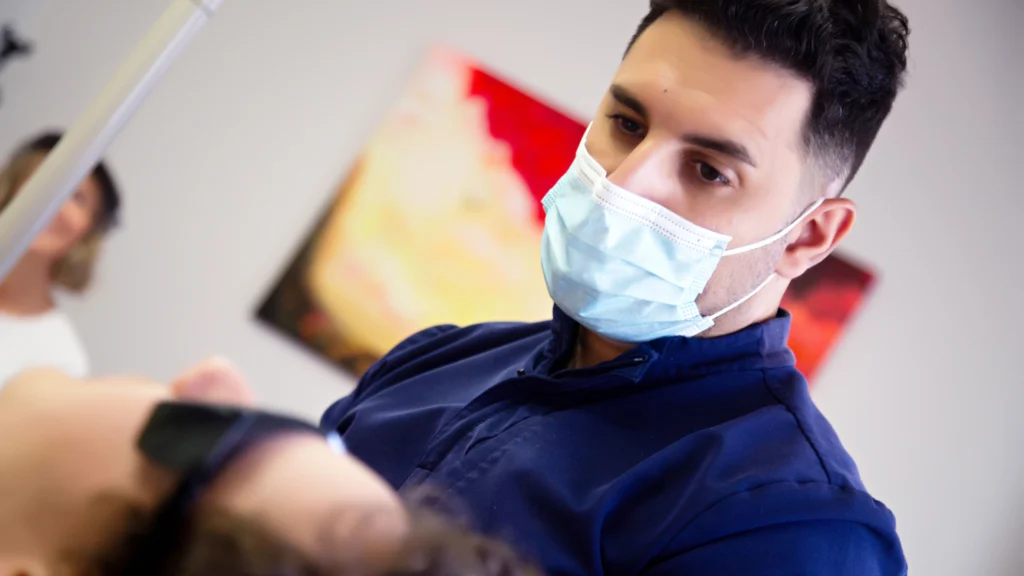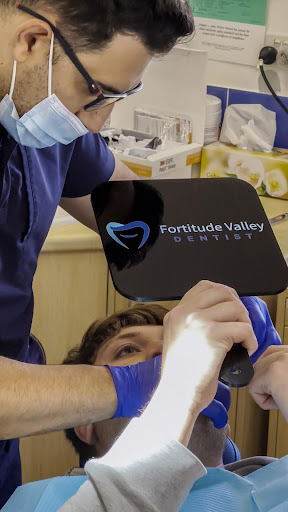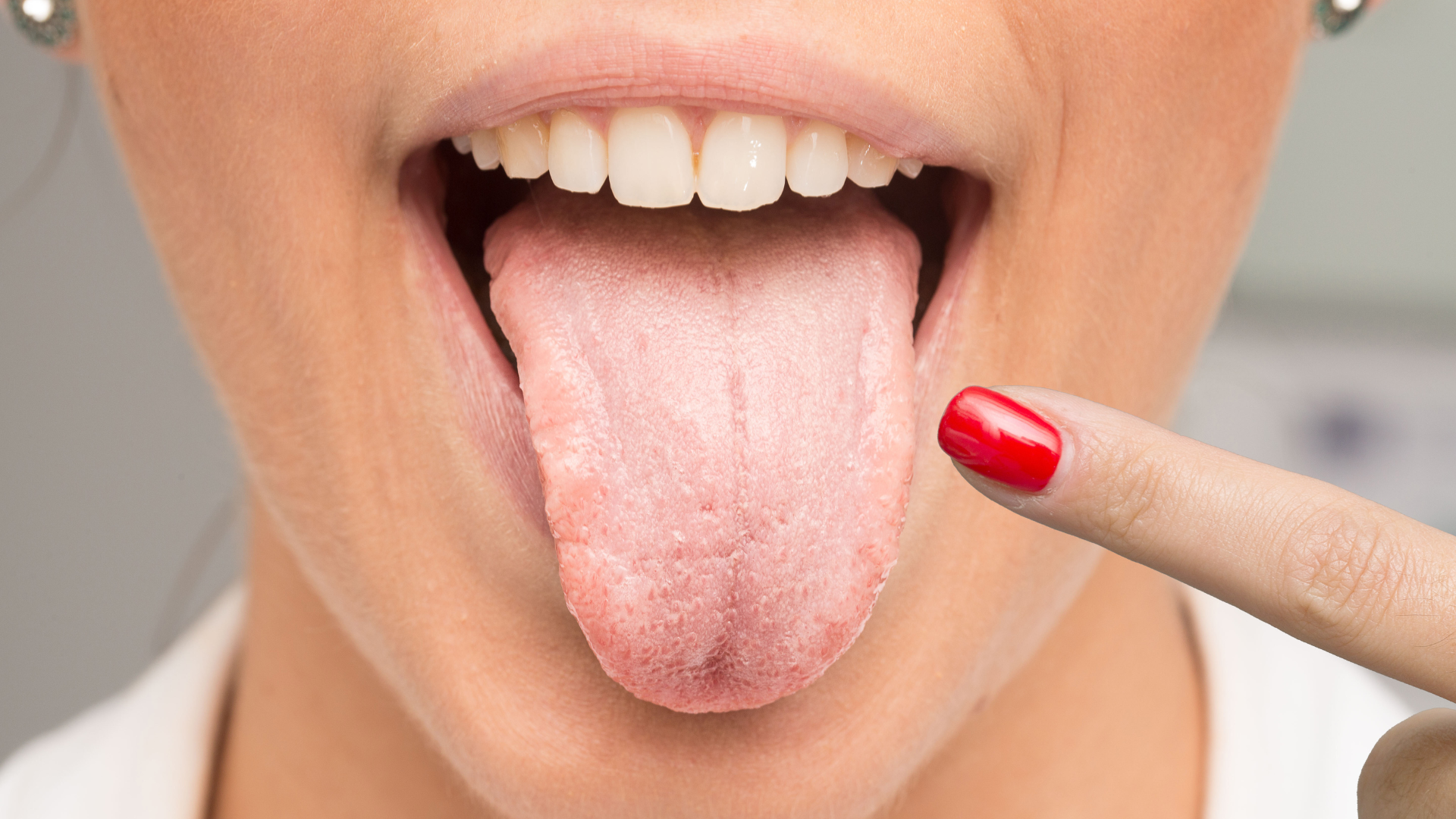While some say the eyes are the window to the soul, at Fortitude Valley Dentist, we like to say the tongue tells the story of your health!
Your tongue is one of the most powerful and telling parts of your mouth. It helps you speak clearly, swallow comfortably, and enjoy the many flavours of life. But beyond its everyday roles, your tongue also acts as a mirror of your overall health — revealing valuable clues about what’s happening inside your body.
Changes in its colour, texture, or appearance can be early warning signs of nutritional deficiencies, infections, or other underlying medical conditions. Paying attention to these subtle signs can help you detect health concerns early and seek the right care before they become more serious.
At Fortitude Valley Dentist, we’re passionate about helping our patients understand the important connections between oral health and overall well-being. Here’s what your tongue might be trying to tell you.

Signs to Watch For
Your tongue can look and feel different for many reasons — from something as simple as dehydration or spicy food, to more complex health conditions. Below are some common tongue changes, what they might mean, and when to visit your dentist or doctor.
Overly Red Tongue
A tongue that appears bright red, smooth, or glossy can sometimes signal a vitamin deficiency, particularly vitamin B12, folic acid, or iron. These nutrients are essential for maintaining healthy cells in your mouth and throughout your body.
A lack of B vitamins can lead to inflammation and tenderness of the tongue, often referred to as glossitis. This condition may cause your tongue to lose its natural texture, making it look smoother than usual.
Other possible causes of a red tongue include:
- Scarlet fever, a bacterial infection that often presents with a “strawberry tongue.”
- Kawasaki disease, which primarily affects children.
- Allergic reactions to foods, dental products, or medications.
If you notice your tongue looks unusually red and the change lasts more than a few days, it’s best to schedule a check-up. Our team at Fortitude Valley Dentist can help identify the cause and, if necessary, refer you to a medical professional for further evaluation.
Tip: Eating a balanced diet rich in leafy greens, eggs, and lean proteins can help maintain healthy vitamin levels and support oral tissue repair.
Sore or Sensitive Tongue
Everyone experiences a sore tongue from time to time, but persistent pain or tenderness could indicate an underlying issue. Common causes include:
- Minor injuries, such as accidentally biting your tongue or irritation from braces, dentures, or sharp teeth.
- Canker sores (aphthous ulcers), small painful spots that appear inside the mouth and often resolve on their own.
- Food sensitivities, especially to acidic or spicy foods.
- Burning mouth syndrome, a chronic condition that causes a burning sensation without visible sores.
If soreness continues for more than a week, it’s important to get it examined. At Fortitude Valley Dentist, we can rule out potential causes such as infection, oral thrush, or allergic reactions.
Pro Tip: Avoid alcohol-based mouthwashes and overly hot foods when your tongue is sore. Instead, rinse with warm salt water to soothe discomfort and promote healing.
White Patches (Leukoplakia)
If you notice white patches or spots that don’t easily scrape off, you might be seeing leukoplakia — a condition caused by chronic irritation of the tongue or inner cheeks.
This irritation often comes from tobacco use, whether smoking or chewing, and occasionally from rough teeth, ill-fitting dentures, or alcohol use.
While most cases are benign, leukoplakia should never be ignored. In some situations, it can be a precancerous lesion, meaning it has the potential to develop into oral cancer if left untreated.
Our dental team can perform a detailed examination and, if needed, refer you for further testing. Detecting these changes early is the best way to protect your long-term oral health.
Prevention Tip: Quitting smoking and moderating alcohol use can significantly reduce your risk of developing leukoplakia and other serious oral conditions.
Red Bumps
Your tongue naturally has small bumps called papillae, which contain your taste buds. However, if you notice larger, inflamed, or painful red bumps that don’t go away after a few days, they may be signaling a problem.
Common causes include:
- Viral or bacterial infections, such as strep throat or oral herpes.
- Irritation from heat or spicy foods.
- Transient lingual papillitis, a temporary inflammation of taste buds (sometimes called “lie bumps”).
If these bumps persist beyond two weeks or are accompanied by other symptoms such as fever, swollen glands, or difficulty swallowing, it’s time for a professional assessment.At Fortitude Valley Dentist, we use advanced diagnostic tools to determine the underlying cause and ensure you receive the right care.
Hairy Tongue
Despite how it sounds, a “hairy tongue” doesn’t involve real hair growth. It’s caused by a build-up of dead skin cells on the papillae, which can trap bacteria, food particles, and even stain from coffee or tobacco.
The tongue may appear black, brown, or yellow and feel slightly rough. While it’s usually harmless, it can cause bad breath or a metallic taste.
Common triggers include:
- Poor oral hygiene
- Smoking or vaping
- Excessive coffee or tea consumption
- Antibiotic use
- Dehydration or dry mouth
Fortunately, this condition can be managed easily with consistent oral care. Brush your tongue gently every day using a soft toothbrush or a tongue scraper, stay hydrated, and avoid irritants like tobacco and alcohol. At Fortitude Valley Dentist, we can provide personalised oral hygiene guidance to help you maintain a clean, healthy mouth.
Beyond Appearance: What Your Tongue Says About Your Overall Health
Your tongue does much more than help you speak, chew, and taste — it’s also a powerful indicator of your body’s internal health. In fact, many health professionals refer to the tongue as a “mirror” of your overall well-being. Subtle changes in its colour, texture, or coating can often reveal what’s happening inside your body — sometimes even before other symptoms appear.
At Fortitude Valley Dentist, we encourage patients to pay attention to their tongue as part of their regular oral health routine. Here’s what your tongue might be telling you about your digestive system, immune health, hydration levels, and oral hygiene — and what you can do to keep it healthy.
1. Digestive Health: Your Gut and Tongue Are Closely Linked
Your tongue and your digestive system share a surprising connection. A coated tongue, for instance, often signals that your digestive system isn’t functioning at its best. When toxins or bacteria build up in your gut, they can also affect your oral environment, creating a white or yellowish coating on the tongue.
This coating may also be accompanied by bad breath or a metallic taste, especially if the balance of good bacteria in your gut is disrupted. Common causes include:
- Poor diet (especially high sugar or processed foods)
- Dehydration
- Lack of fibre
- Antibiotic use or gastrointestinal imbalance
What You Can Do:
- Drink plenty of water throughout the day to help flush toxins and support saliva production.
- Eat a balanced, fibre-rich diet with plenty of fruits, vegetables, and probiotics (like yogurt or kefir) to nourish healthy gut bacteria.
- Brush your teeth and clean your tongue gently with a tongue scraper to remove buildup and maintain oral freshness.
When your gut is healthy, your tongue often becomes clearer, smoother, and naturally pink again — a sign that your body is in balance.
2. Immune System Function: Your Tongue Reflects Your Body’s Defences
Recurring ulcers, red patches, or irritation on the tongue can sometimes point to a weakened immune system. When your immune defences are low — due to stress, illness, or fatigue — even small irritations can take longer to heal or become more painful than usual.
Your tongue’s condition can also change during times of infection or inflammation. For example, a pale tongue might indicate low iron or vitamin B12 levels, while a red, inflamed tongue could signal a deficiency in folate or niacin — nutrients vital to immune function.
At Fortitude Valley Dentist, we often see these signs during check-ups and help patients identify the underlying causes, sometimes recommending coordination with a GP or nutritionist for further testing.
How to Support Your Immune Health (and Your Tongue):
- Eat nutrient-rich foods like leafy greens, citrus fruits, nuts, and lean proteins.
- Manage stress through mindfulness, exercise, and adequate sleep.
- Keep your mouth clean and hydrated — bacteria thrive when the mouth is dry or inflamed. When your immune system is strong, your tongue typically heals quickly and maintains a healthy, pink tone
3. Oral Hygiene Habits: The Tongue’s Role in a Healthy Mouth
A clean, pink tongue is one of the clearest signs of good oral hygiene. Your tongue’s surface naturally traps bacteria, food particles, and dead cells — and when it’s not cleaned regularly, these can form a film or coating that leads to bad breath (halitosis) and increases your risk of gum disease.
If your tongue appears white, brown, or yellowish, or has a rough or patchy surface, it may be a sign that your oral hygiene routine needs improvement.
At Fortitude Valley Dentist, we teach patients simple but effective ways to care for their tongue as part of their daily routine:
Our Recommendations for Optimal Oral Hygiene:
- Brush your tongue gently every time you brush your teeth, or use a tongue scraper to remove buildup.
- Floss daily to eliminate bacteria between teeth that can migrate to the tongue.
- Visit your dentist regularly for professional cleaning and check-ups.
- Avoid smoking or excessive alcohol, as these can dry the mouth and promote bacterial growth.
A healthy tongue not only enhances your smile and freshens your breath — it also supports your entire oral ecosystem, keeping your gums and teeth healthy for years to come.
4. Hydration Levels: Your Tongue and Saliva Work Together
A dry, sticky, or rough tongue often means your body needs more water. Hydration is essential for saliva production — and saliva is your mouth’s natural defence mechanism. It washes away food particles, neutralises acids, and protects against decay and infections.
When you’re dehydrated, your tongue may look cracked, shiny, or unusually red, and your mouth might feel dry or uncomfortable. Chronic dehydration can also increase your risk of cavities and gum problems.
Tips to Stay Hydrated and Maintain a Healthy Tongue:
- Drink water consistently throughout the day (not just when you’re thirsty).
- Limit caffeine, alcohol, and sugary drinks — all of which can dry your mouth.
- Eat water-rich foods like cucumber, melon, and oranges.
- Use a humidifier at night if you breathe through your mouth or live in a dry environment.
By maintaining proper hydration, you help your mouth stay balanced, your breath stay fresh, and your tongue retain its natural, healthy appearance
The Bigger Picture: Your Tongue Is a Health Barometer
Your tongue isn’t just a part of your smile — it’s a health barometer for your entire body. From your digestive system to your immune defences, hydration, and daily habits, it reflects how well your body is functioning. Paying attention to small changes in its appearance can help you detect imbalances early and take action before they become more serious.
At Fortitude Valley Dentist, we take pride in helping our patients understand these subtle signs. During each visit, we don’t just look at your teeth — we assess the overall condition of your tongue, gums, and oral tissues to ensure that every aspect of your oral health supports your general wellness.
If you’ve noticed changes in your tongue’s colour, texture, or coating, or you’re simply curious about what it might mean, our friendly team is here to help.
Maintaining a Healthy Tongue and Mouth
Keeping your tongue healthy goes hand-in-hand with maintaining overall oral health. Here are simple yet effective ways to care for it daily:
- Brush and scrape your tongue daily.
After brushing your teeth, gently clean your tongue with a scraper or soft-bristled brush to remove bacteria and debris. - Stay hydrated.
Water keeps your mouth moist and helps flush away bacteria. - Avoid tobacco and excessive alcohol.
These irritants can lead to staining, dryness, and more serious oral conditions. - Maintain a balanced diet.
Nutrients like iron, folate, and vitamin B12 are vital for tongue and tissue health. - Schedule regular dental check-ups.
Professional cleanings and exams help identify early signs of oral disease, often before symptoms appear.
At Fortitude Valley Dentist, we take the time to look at all aspects of your oral health — including the tongue — to ensure nothing goes unnoticed.
When to See a Dentist

Your tongue might seem like a small part of your mouth, but it plays a big role in your health. Because it’s so sensitive, even slight changes can indicate that something deeper is going on. That’s why it’s important to pay attention to how your tongue looks and feels — and to know when to seek professional advice.
If you notice any of the following signs, it’s best to book an appointment with your dentist right away:
White or Red Patches That Don’t Go Away After Two Weeks
Occasional discolouration can happen from something as simple as coffee stains, irritation from hot food, or minor injuries. However, white or red patches that persist may signal something more serious, such as leukoplakia, oral thrush, or even early signs of oral cancer.
While these conditions don’t always indicate something dangerous, it’s essential to have them checked promptly. Your dentist can determine whether it’s a harmless irritation or something that requires treatment or further investigation.
Persistent Pain or Tenderness
A sore tongue that doesn’t heal after a week or two shouldn’t be ignored. Pain or sensitivity may stem from mouth ulcers, bacterial infections, or irritation from dental appliances — but it can also indicate nutritional deficiencies or nerve-related conditions.
If the discomfort makes it difficult to eat, speak, or swallow, let your dentist know as soon as possible. At Fortitude Valley Dentist, we’ll assess the area carefully and recommend the best course of treatment to relieve your discomfort and restore your oral health.
Changes in Tongue Shape, Colour, or Coating
Your tongue should normally appear pink and slightly rough. Any sudden or gradual change in colour (white, red, purple, or black), shape, or coating could suggest infection, inflammation, or imbalance in your body.
For example, a pale tongue might indicate anaemia, while a thick white coating may point to fungal infection or poor oral hygiene. If you notice that your tongue looks dramatically different, it’s worth having it evaluated — especially if the change doesn’t improve with brushing or cleaning.
Changes in Tongue Shape, Colour, or Coating
Your tongue should normally appear pink and slightly rough. Any sudden or gradual change in colour (white, red, purple, or black), shape, or coating could suggest infection, inflammation, or imbalance in your body.
For example, a pale tongue might indicate anaemia, while a thick white coating may point to fungal infection or poor oral hygiene. If you notice that your tongue looks dramatically different, it’s worth having it evaluated — especially if the change doesn’t improve with brushing or cleaning.
Difficulty Swallowing or Moving Your Tongue
Trouble swallowing, speaking, or moving your tongue freely can interfere with daily life and may indicate inflammation, infection, or nerve issues. Sometimes, it can even signal a more serious condition affecting your throat or mouth.
Your dentist will perform a thorough oral examination to identify any swelling, lesion, or obstruction that could be causing discomfort. Early assessment ensures that any underlying problem — no matter how small — is treated before it worsens.
Unexplained Lumps, Sores, or Burning Sensations
Any unexplained bump, lump, or ulcer that doesn’t heal within two weeks should be checked immediately. Although most are harmless — like small canker sores or irritation from biting your tongue — some could be signs of infection or early oral cancer.
A burning or tingling sensation without visible sores can also point to conditions such as burning mouth syndrome or vitamin deficiencies. These symptoms may not always be visible but are equally important to investigate.
Why Early Diagnosis Matters
Even if a change seems small or harmless, it’s always safer to have it checked. The mouth heals quickly, so any symptom that lingers longer than two weeks is worth attention.
Early diagnosis allows your dentist to treat infections, inflammation, or irritations before they spread or cause long-term issues. It can also be life-saving in cases where changes are linked to precancerous or cancerous lesions. At Fortitude Valley Dentist, we believe prevention is the best form of care. Our team takes every concern seriously — no matter how minor — and provides gentle, thorough examinations to give you peace of mind and the best possible outcome.
Your Partner in Oral Health
Your tongue’s condition reflects more than just your oral hygiene — it often mirrors your body’s overall well-being. If something doesn’t look or feel right, don’t wait for it to go away on its own.Book your appointment with Fortitude Valley Dentist today.
Our compassionate dental professionals are here to help you identify the cause, provide tailored treatment, and keep your smile — and your health — in excellent shape
How Fortitude Valley Dentist Can Help
At Fortitude Valley Dentist, we believe that oral health is a reflection of your overall well-being. Your mouth is more than just your teeth — it’s an important gateway to your body’s health. That’s why our approach focuses on comprehensive care, where every detail matters, from your gums and tongue to the soft tissues of your mouth.
Our goal is to help you not only achieve a beautiful smile but also maintain a healthy mouth that supports your whole-body wellness. Whether you’re experiencing changes in your tongue, discomfort, or simply due for your regular check-up, our team is here to provide expert care in a comfortable, stress-free environment.
What to Expect During Your Visit
When you visit Fortitude Valley Dentist, you can expect a thorough, personalised experience from start to finish. We take the time to listen, assess, and explain — ensuring you understand your oral health at every step.
Here’s what our comprehensive care includes:
Comprehensive Oral Examination
Your appointment begins with a full oral health assessment. We examine not only your teeth but also your tongue, gums, cheeks, and other soft tissues. Using advanced technology and gentle techniques, we identify any irregularities, colour changes, coating, or swelling that could indicate an underlying issue.
This detailed approach allows us to detect even subtle changes early — before they progress into more serious conditions.
Identification of Irregularities, Coating, or Inflammation
Your tongue can show early signs of infection, irritation, or nutrient deficiencies. During your exam, we look closely for signs such as white patches, redness, ulcers, or unusual textures. If we notice anything out of the ordinary, we’ll investigate further to determine the cause and provide the appropriate treatment or management plan. By addressing these signs early, we help you maintain both oral comfort and overall wellness.
Personalised Treatment and Advice
Every patient is unique, and so is every tongue! We’ll provide tailored advice to help you care for your mouth at home — from daily hygiene tips and nutrition guidance to the best ways to prevent irritation or build-up.
If treatment is required, we’ll walk you through your options clearly and compassionately, ensuring you feel confident and informed. Our gentle approach means your comfort and peace of mind always come first.
Lifestyle and Preventive Guidance
A healthy tongue and mouth start with good daily habits. Our team offers practical, easy-to-follow recommendations to support your oral health long-term. This may include:
- Proper brushing and tongue-cleaning techniques
- Dietary advice to improve vitamin intake and hydration
- Avoiding irritants like tobacco and excessive alcohol
- Managing stress and maintaining good sleep for overall wellness
We don’t just treat problems — we help you prevent them, empowering you with knowledge and personalised care plans that fit your lifestyle.
Collaboration with Medical Professionals
Some tongue or oral changes may be linked to broader health issues, such as vitamin deficiencies, immune conditions, or systemic diseases. In these cases, our team works closely with trusted medical professionals to ensure you receive comprehensive, coordinated care.
By collaborating with your GP, nutritionist, or specialist when needed, we help ensure that your oral health is fully supported from every angle.
A Team That Truly Cares
At Fortitude Valley Dentist, we’re proud to combine advanced dental technology with a compassionate, patient-first approach. Our friendly, experienced team is dedicated to helping you feel comfortable and confident throughout your visit — whether it’s your first time seeing us or your regular check-up. We understand that dental visits can sometimes feel intimidating, which is why we prioritise clear communication, gentle care, and a welcoming atmosphere. You’re not just a patient — you’re part of our dental family.
Your Health Starts with Your Smile
Your tongue and oral tissues can tell a lot about your body’s overall health — and we’re here to help you interpret those signs. With regular check-ups, professional cleanings, and ongoing care, you can keep your mouth healthy, your smile bright, and your body well-balanced.
If you’ve noticed unusual changes in your tongue — or simply want peace of mind — don’t wait.
Book an appointment with Fortitude Valley Dentist today.
Our caring team will help you uncover what your tongue may be telling you and guide you toward a healthier, more confident you.
Take the Next Step Toward Better Oral Health
Your tongue can reveal more about your health than you might imagine. By paying attention to its appearance and maintaining consistent oral care, you can prevent many issues and stay ahead of potential health concerns.
At Fortitude Valley Dentist, we’re here to help you understand the signs your mouth is sending and provide gentle, personalised care to keep your smile — and your health — in top shape.
If you’ve noticed any unusual changes in your tongue or are simply due for a routine check-up, don’t wait.
Book an appointment with Fortitude Valley Dentist today and let our friendly team help you uncover the story your tongue is telling — for a healthier, brighter smile and a better you.


